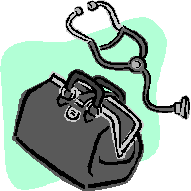
Health Chat - Tips
Stress
National Mind have published 10 top tips to tackle stress.
1. Make the connection - could that fact that you are felling under-the-weather be a response to too much pressure?
2. Take a regular break - give yourself a brief break whenever you feel things are getting on top of you. Get a soft drink or take a brief stroll.
3. Learn to relax - follow a simple routine to relax your muscles and slow your breathing.
Try following this simple routine:
- close your eyes and breathe slowly and deeply
- locate any areas of tension and try to relax those muscles; imagine the tension disappearing
- relax each part of your body in turn. From your feet to the top of your head.
- as you focus on each part of your body think of warmth, heaviness and relaxation.
- after 20 minutes take some deep breaths and stretch your body.
4. Get organised - make a list of jobs. Tackle one at a time. Alternate dull tasks with interesting ones.
5. Sort out your worries - divide them into two groups: those that you can do something about (either now or soon) and those you can't. There is no point in worrying about things that you can't change.
6. Change what you can - look at the problems that can be resolved and get whatever help is necessary to sort them out. Learn to say NO.
7. Look at your long term priorities - step back and look at what it is in your life that is giving you too much stress. what can you offload or change? How can you introduce a better balance between work, social life and home life? Is it time to reassess your priorities?
8. Improve your lifestyle - find time to eat properly, get plenty of exercise and enough sleep. Avoid drinking and smoking too much. However much you believe they can help you to relax they will have the opposite effect.
9 Confide in someone - don't keep emotions bottled up
10. Focus on the positive aspects of your life.
The public are being asked to ‘Act FAST’ on stroke and
learn how to recognise the signs of a stroke and to call 999 if a stroke is
suspected. The focus for this is the ‘Face, Arms, and Speech Test’ or FAST,
that tests for the symptoms of stroke and was developed through research
funded by The Stroke Association. The test stands for:
Facial weakness
Arm weakness
Speech problems
Test all three!
In other words ask the person affected to Smile, then ask them to Raise Both Arms and then ask them to Say Something Simple like - "It's a lovely day today."
If they fail any of the tests dial 999.
For further information look at www.stroke.org.uk
If you come across an incident and you need to phone for an ambulance you can dial 999 on any phone - even if it is locked. 999 or 112 (the global number for the emergency services) bypasses the keypad lock on mobile phones - the victim may have one even if you don't.